ASRock Brings Zen 2 NUC : 4X4 BOX-4800U Renoir Mini-PC Reviewed
by Ganesh T S on November 25, 2020 11:00 AM ESTBAPCo SYSmark 25
The ASRock 4X4 BOX-4800U was evaluated using our Fall 2020 test suite for small-form factor PCs. In the first section, we will be looking at SYSmark 25.
BAPCo's SYSmark 25 is an application-based benchmark that uses real-world applications to replay usage patterns of business users in the areas of productivity, creativity, and responsiveness. The 'Productivity Scenario' covers office-centric activities including word processing, spreadsheet usage, financial analysis, software development, application installation, file compression, and e-mail management. The 'Creativity Scenario' represents media-centric activities such as digital photo processing, AI and ML for face recognition in photos and videos for the purpose of content creation, etc. The 'Responsiveness Scenario' evaluates the ability of the system to react in a quick manner to user inputs in areas such as application and file launches, web browsing, and multi-tasking.
Scores are meant to be compared against a reference desktop (the SYSmark 25 calibration system, a Lenovo Thinkcenter M720q with a Core i5-8500T and 8GB of DDR4 memory to go with a 256GB M.2 NVMe SSD). The calibration system scores 1000 in each of the scenarios. A score of, say, 2000, would imply that the system under test is twice as fast as the reference system.
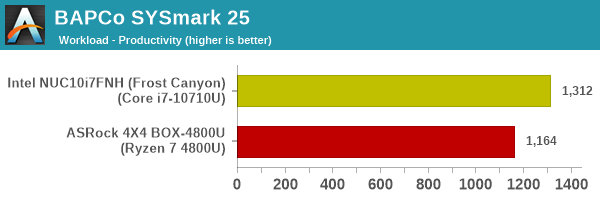
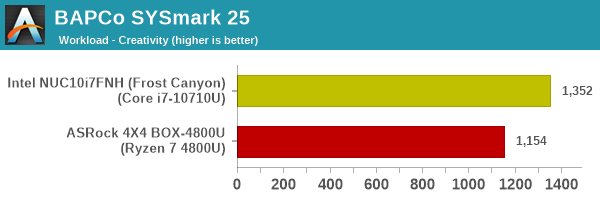
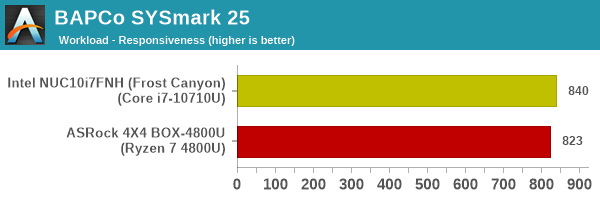
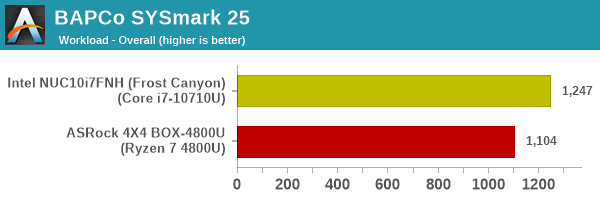
SYSmark 25 also adds energy measurement to the mix. A high score in the SYSmark benchmarks might be nice to have, but, potential customers also need to determine the balance between power consumption and the efficiency of the system. For example, in the average office scenario, it might not be worth purchasing a noisy and power-hungry PC just because it ends up with a 2000 score in the SYSmark 25 benchmarks. In order to provide a balanced perspective, SYSmark 25 also allows vendors and decision makers to track the energy consumption during each workload. In the graphs below, we find the total energy consumed by the PC under test for a single iteration of each SYSmark 25 workload. For reference, the calibration system consumes 8.88 Wh for productivity, 10.81 Wh for creativity, and 19.69 Wh overall.
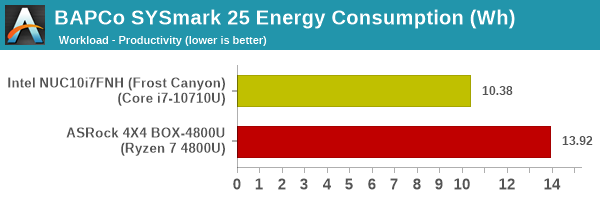
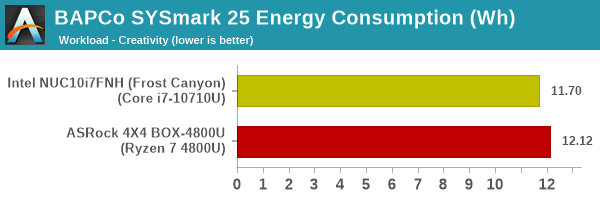
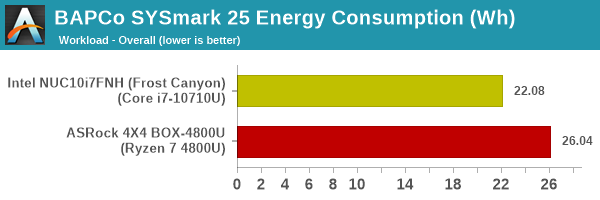
Traditional office and content creation workloads continue to be influenced heavily by single-threaded performance. Based on the above results, it can be said that the Frost Canyon NUC has a slight edge in performance as well as power consumption. It must be noted that the Renoir APU attempts to place 8 CPU cores within a 15W power envelop, while the Comet Lake-U SKU has only 6 cores within a similar profile. Applications unable to take advantage of all the 8 cores may end up performing better on Comet Lake-U, as seen in the above results.










53 Comments
View All Comments
Stoinis MO - Thursday, December 3, 2020 - link
Macy’s cardholders need to activate their Macy’s card. Macy’s Card Activation allow their customer to activate Macy’s Card if users want to activate their Macy’s Card then with this post customers didn’t have to do more hard things.http://philagribiz.com/macys-card-activation/
deil - Thursday, November 26, 2020 - link
About ram it depends on how you work, I have 32GB and it daily goes above 24GB used, while browser/slack/spotify/30tabs on ff and few other things that I just never close take ~6GB. (I am on linux, it does use ram way more conservative that windows) When I last time used windows for work it did abuse all 32GB and started to slow down.its up to what you do and on 16GB it mostly work, but at least in my case 2-3 times a day I need a bit more, and like once a week 16GB is just not enough.
as It costs just like 70$ once, and it saves me few minutes daily, I think it paid for itself in my health at least.
damianrobertjones - Thursday, November 26, 2020 - link
Plus there's also SUperfectch that caches various duties. A lot of people forget that.Spunjji - Friday, November 27, 2020 - link
"...I've had more crashes in a month than in years of Intel/Nvidia systems. I've lost more time to lost work than when I was using Windows 98..."I'm calling bullshit on that. My understanding is that the APU driver situation isn't as good as discrete components (which I'm currently running without issue), but I can't believe that it's *worse than Windows 98*.
philehidiot - Monday, November 30, 2020 - link
Bullshit? Perhaps because you've just made assumptions about the set up? Read properly before accusing people of lying.Thanks.
at_clucks - Thursday, December 3, 2020 - link
I guess they were saying it's PEBKAC. Which it is. Having even 2 or 3 crashes in a month is already too much to be caused by AMD, their hardware, or their drivers, or else tens or hundreds of thousands of people would be affected and you'd hear about it. Not saying their drivers are perfect but if your PC is constantly crashing *you* have a problem. You probably don;t really know what's happening in there but you heard a rumor...I lost count of how many acquaintances had rootkit encrusted PCs, full of every garbage known to man after clicking on everything that fell under their mouse, everything running with hacks, cracks, and other torrented junk, from the OS image to the "security" software. They had no idea what's going on but all had some form of (ridiculous) theory based of stuff they heard from someone, or read on the internet but probably neither them nor their source understood it.
Fix your stuff, stop blaming the tools. Also having at least a decent meal before drinking helps.
Radhouse - Friday, November 27, 2020 - link
Interesting experience. I've been using an ASUS PN50 R5 4500 system for 2 months as my entertainment computer without a single crash, and typically keep 25+ web pages open in Chrome. It is configured with 32 GB 3200 MHz Crucial memory and an 500 GB EV0 970 Plus SSD running Windows 10 Pro 20H2. (Initially installed V 2004) In addition to Chrome, I'm a heavy user of the following Apps; Netflix, Amazon, & Hulu.I'm not sure where the source of your problems, but I've been also running a PN50 R3 system as a workstation without any issues.
Targon - Friday, November 27, 2020 - link
No problem with AMD drivers for my X370 based motherboard, Ryzen 9 3900X CPU, or Vega64 reference model video card(yes, I need a 6800X or 6900X, just waiting on the 6900X to be released at this point). People who claim to have this or that problem may be encountering problems between components that in turn cause their issues with Radeon cards. Looking for what is in common between people who have a problem and then looking at those without problems to see what the differences are is something that most people don't seem to understand.QA process: Reproduce problem, identify source of problem, figure out workaround or fix for the problem.
philehidiot - Monday, November 30, 2020 - link
Your set up is very close to mine. 3900x, vega64, but I'm on the x570 mobo.What is very strange is these crashes are happening at low load (as is when working). No crashes during games or when I'm hammering it. It is unlikely to be a dodgy background application as it's a fairly new install and I routinely avoid installing bloat, etc. Only stuff required to make it go is enabled on start up to this end.
I'm on the verge of shifting to Linux but for one major issue - I have a decent sound card which is not supported in Linux. I'm unwilling to unplug and ditch a few hundred quid worth of kit. Hopeful Linux drivers will emerge but creative aren't exactly helpful.
damianrobertjones - Monday, November 30, 2020 - link
Shift. Do it. Go to linux. You might then appreciate Windows a little more. Maybe. Both platforms have issues.